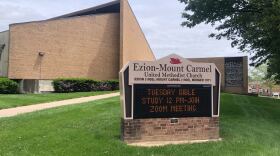Two pastors are suing Gov. John Carney over restricting religious freedom in the state.
But a legal expert says they are unlikely to be successful.
Two Delaware pastors argue their freedom of religion under the Delaware Constitution was violated when Gov. Carney implemented his emergency orders to prevent the spread of the coronavirus pandemic early last year.
Their lawyers say the state government shouldn’t be able to tell any church when it should close its doors.
Alan Garfield is a constitutional law scholar at Widener University Delaware Law School. He says at the federal level the courts have never sided with that, and always recognized that constitutional rights have limits.
“Just imagine a religious group that says, well our religion says we have to sacrifice a young virgin once a year to our god,” he says. “Are they gonna be exempt because their religion tells them they have to do this?”
Garfield says in their state suits, the pastors are arguing that gathering in person is a critical part of their religion, and that allowing supermarkets and liquor stores to operate without capacity restrictions is unfair to churches.
However, Garfield adds something is overlooked in that argument, people don’t act the same in a church as they do in a store; they don’t often gather in large numbers, spend more than an hour inside or sing songs.
“I can’t imagine that the courts are gonna say — given that line in the constitution you could do whatever you want including human sacrifices as long as you do them in the context of religious service,” Garfield says. “Clearly there’s gotta be, there are overriding governmental interests which could regulate even religious services.”
He says Carney’s lawyers could argue churches were treated like similar venues, such as theatres or concert halls — where people gather for long periods of time in close proximity; therefore restricting the ability to attend services in person wasn’t meant to restrict freedom of religion.
And Garfield adds it’s important to note that the lack of knowledge we had about how the Coronavirus spread required the use of strict lockdowns and restrictions. But as we learned that larger groups could gather with proper precautions, restrictions began lifting.
After a federal lawsuit last year, Carney agreed to lift some restrictions on churches, as well as treat them neutrally in any future emergency orders.
Roman Battaglia is a corps member with Report for America, a national service program that places journalists into local newsrooms.







